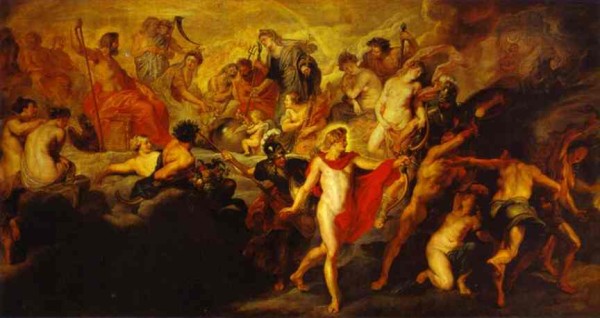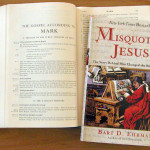The Gods of Israel: Does the Bible Promote Polytheism?
by Dr. Matthew Ramage
Filed under The Bible
“What great nation is there that has a god so near to it as the LORD our God is to us, whenever we call upon him?” This passage from the Book of Deuteronomy was recently proclaimed in the Catholic Church’s Lenten liturgy, and it touched right at the heart of something I have been pondering for some time: evidence of polytheism in the Bible and the relationship between ancient Israelite and Canaanite religious traditions.
Popular critics of the Judeo-Christian God frequently focus on the apparent incompatibility of the biblical portrait of God with what we insist must be essential moral attributes of the divine nature should it even exist. Both critics and believers, however, are often unaware of another crucial problem that would seem to contradict traditional Christian doctrine concerning the nature of God. In a nutshell, the tension lies not only in the relation of the biblical God to violence and evil, but also on the arguably more fundamental level of whether the Bible reflects belief in only one divine being in the first place.
I have devoted a chapter to this very theme in my book Dark Passages of the Bible, and even there I barely scratch the surface of this issue. Nevertheless, I have continued to ponder this issue over the past couple years and believe something meaningful can be said within the constraints of a blog post.
Biblical Henotheism and Canaanite Religion
First we have to acquaint ourselves with a sampling of concrete biblical texts which illustrate the particular problem. Here I will focus on just a few examples from the Book of Psalms:
"God has taken his place in the divine council;
in the midst of the gods he holds judgment." (Ps 82:1)
"For who in the skies can be compared to the LORD?
Who among the heavenly beings is like the LORD,
a God feared in the council of the holy ones,
great and terrible above all that are round about him?
O LORD God of hosts,
who is mighty as thou art, O LORD,
with thy faithfulness round about thee?" (Ps 89:6-8)
"For the LORD is a great God,
and a great King above all gods." (Ps 95:3).
Christians typically do not read the above texts with the assumption that multiple divine beings exist. We know that there is only one God—so the argument goes—therefore the “gods” of which the Psalmist speaks clearly must not refer to other divinities. This view runs throughout the Church Fathers and is illustrated in St. Augustine’s exegesis of Ps 82:1 cited above: “[The psalm] begins,” he says, “God stood in the synagogue of gods. Far be it from us, however, to understand by these gods the gods of the Gentiles, or idols, or any creature in heaven or earth except men.” In line with a venerable Jewish tradition (one invoked by Jesus on a similar text and an issue I simply cannot take up within the constraints of this post), here “the gods” or “holy ones” refer to the saints, that is to say the human faithful who have been made like God through entry into covenant with him.
For thoughtful believers and unbelievers alike, however, the question remains: Does the above explanation truly do justice to what the human author(s) of the Book of Psalms intended to say? In other words, did these authors really have humans in mind when speaking of “heavenly beings” who dwell “in the skies”? Philosophically speaking, it is impossible to prove that the psalmist couldn’t have meant humans here. But the question is whether this is the most reasonable and likely reading of his words. When one achieves an acquaintance with the whole array of biblical evidence to the contrary—evidence, again, of which even my book only touches the surface—it becomes increasingly difficult to side with Augustine on this particular point without a further word of explanation. Now a staunch Christian might disagree, insisting he can offer a satisfactory explanation to individual problematic texts on a case by case basis. However, after a certain amount of study and by what Newman calls a “cumulation of probabilities,” the evidence amasses and the scale tips. Conventional pre-critical explanations alone no longer suffice to account for the data. As a colleague of mine once said, “You may be able to dodge snowflakes, but you can’t dodge a snowstorm that has come right upon you.”
So what is really going on in texts like the psalms sampled above? A Catholic ecclesiastic and biblical scholar of no less stature than Pope Benedict XVI himself recognized that we are witnessing here traces of polytheism, or, more precisely, henotheism in the Bible. Even the official religion of Israel, Benedict tells us, did not at first deny the existence of other gods than Yahweh. Henotheism, also sometimes called monolatry, refers to religious worldviews in which the existence of more than one divinity is taken for granted, while worship is rendered only to the being considered highest among them.
If it is not apparent to the reader simply from a survey of the Scriptures themselves, I find the case for henotheism in certain parts of the Old Testament to be undeniable when reading it against its broader Ancient Near Eastern background. A number of erudite studies explore the evidence for this claim, for example John Day’s Yahweh and the Gods and Goddesses of Canaan, William Dever’s Did God Have a Wife?, and Mark Smith’s works The Origins of Biblical Monotheism and The Early History of God. Beginning with Frank Cross’s 1973 work Canaanite Myth and Hebrew Epic and continuing in more contemporary works such as those mentioned above, scholars have argued that the earliest literary strata of the Israelite tradition from the 1st millennium B.C. reflect a dependence upon much older Canaanite religious traditions. Remember, Canaan is the Promised Land conquered by the Israelites, and this land had its own robust culture which naturally exerted significant influence upon the people of Israel.
The religion of Canaan during the 2nd millennium B.C. is well depicted in the hundreds of cuneiform tablets excavated at the ancient sea port of Ugarit (located in modern Syria) during the last century. Thanks to these archaeological discoveries, we are now aware of some 150 Canaanite deities, including many who make an appearance in the Old Testament: El, Baal, Yam, Mot, and Asherah, to name a few. It is noteworthy that Yahweh does not appear in the genealogies at Ugarit. It seems that Yahweh came into Canaan from the outside. Where precisely scholars do not agree upon, but the narrative of Moses at the burning bush offers us the Israelite view: Only with the revelation to Moses is the God of Israel revealed as Yahweh. As God tells Moses, “I appeared to Abraham, to Isaac, and to Jacob, as God Almighty, but by my name the LORD [Yahweh] I did not make myself known to them” (Exodus 6:3).
The high god of the ancient Canaanite pantheon was named El. Fascinatingly, El also appears as one of the principal designations for God throughout the entire Old Testament. The form can occur in the singular (El), in the plural (Elohim), or in what is known as construct form. For instance, El-Bethel identifies him with a physical place, while the personal name “Elijah” means “My God (literally, my El) is Yahweh.” Depending on the translation one is using, typically El is translated generically as “god,” a move that makes sense seeing as the Hebrew tradition eventually lost consciousness of El as a divine being distinct from Yahweh. Elohim (literally, “the gods”) thus can be used to characterize a group of false gods, but it is also used for Israel’s one God despite the thought-provoking fact that the word is grammatically plural. Often one finds Elohim alongside Yahweh (itself often rendered “LORD”). Thus in translating Yahweh Elohim in Psalm 89:8, the RSV gives us “LORD God.” In the Psalmist’s view, these two words clearly refer to the same divine being. An abundance of evidence, however, suggests that an earlier stage within the Israelite tradition saw the two as distinct gods.
Of all the biblical texts that could be cited to this effect, perhaps the most poignant is Deuteronomy 32:8-9, which casts Yahweh as one of the “sons of El”:
"When the Most High [Elyon] gave to the nations their inheritance,
when he separated the sons of men,
he fixed the bounds of the peoples
according to the number of the sons of God.
For the LORD's [Yahweh’s] portion is his people,
Jacob his allotted heritage."
For me it is always illuminating to read various Bible translations against the ancient manuscript traditions they are trying to render in our modern languages. In the case of Deuteronomy 32:8 above, the RSV does not reproduce the Hebrew Elyon (which, likely referring to a particular manifestation of El, has no equivalent in English). Rather, it follows the Greek Septuagint’s hypsistos in giving us “the Most High.” According to its standard practice, the RSV likewise follows the Greek kyrios giving us “LORD” rather than reproducing the Hebrew Yahweh. But for me the most interesting choice concerns the expression “of the sons of God.” Here the standard Hebrew Masoretic Text reads bene Israel (the sons of Israel). The Septuagint reads angelon tou theou (the angels of God), reflecting a later understanding that beings once identified as gods would better be characterized as angels.
Why, then, does the RSV say “sons of God”? In reading the footnotes to the critical edition of the Hebrew Bible, one discovers that this is the suggested emendation which is “probably right” based on comparisons with other extant manuscript evidence (Qumran, Symmachus, Old Latin, etc.). Essentially, the editors of the Bible are arguing that either bene el (“sons of God”) or bene elim (“sons of the gods”) represents the most ancient tradition of the text from Deuteronomy even though this is not the expression found in the manuscripts upon which we typically base our translations.
The reason why the editors consider this to be the original text lies precisely in the awareness of the Hebrew Bible’s dependence upon earlier Canaanite traditions. A key concept in the Canaanite religion was that of the “divine council,” a royal court of divinities collectively known as “the sons of El.” As we know from the archaeological evidence, El was the high god of this heavenly court, while the other gods ministered to him. In its own turn, Deuteronomy 32:8-9 appears to reflect the Canaanite belief that El had assigned each nation its own guardian god. Thus Deuteronomy may well be offering us a privileged glimpse of a stage in the Israelite tradition wherein El and Yahweh were still considered distinct deities.
If the above supposition is true, then one may ask why the Septuagint and Masoretic Text changed the original text to “angels of God” and “sons of Israel,” respectively. As Benedict XVI always taught us in his biblical exegesis, one ought not to exaggerate claims to certainty on such questions, yet, in light of the preponderance of evidence, scholars can still offer the following reasonable explanation: The Bible is best thought of not as a monolithic monotheistic tome but a rich and complex body of “monotheizing” literature. Later strata of the Israelite tradition built upon what came earlier, in the process developing this thought while at the same time polishing it. In contrast with the more ancient version of the text which still harbored traces of Canaanite lore, later biblical versions were produced with an emphasis on showing that the “the sons of the gods” did not actually exist. Eliminating any polytheistic or henotheistic overtones in the earlier tradition, these later editions intended to proclaim that there exists only one El, and his name is Yahweh.
Christians and Atheists: Looking at the Same Evidence, Drawing Different Conclusions
At least for some believers and non-believers, what I have said above may represent common ground in terms of evidence we can agree upon. My summary might even square perfectly with other observations the non-believer has previously made concerning the Bible, seeing in it a frail work made by human hands and subject to countless alterations over the centuries. Again, all of this might simply confirm the skeptic’s conviction that the Bible is nothing more than a human work replete with discrepancies, errors, and cover-ups. What I wish to say in this post—and what I want you believers out there to take home—is that the Christian can look boldly and critically at the same evidence the atheist perceives to be deeply problematic, and in doing so actually grow deeper in your faith.
As Joseph Ratzinger famously taught in his 1988 Erasmus Lecture in New York, the real debate in exegesis is at bottom a philosophical one. Every one of us begins our reading of the Bible already with a particular interpretative lens, with a conscious or unconscious set of presuppositions which in turn color the conclusions we draw from an examination of the biblical data. In our case as Christians, we admittedly read the Bible with the eyes of faith. As I hope you can tell from reading this post, this need not and should not mean that we neglect modern scholarship, but it does mean that we operate with the conviction that the Bible’s idiosyncrasies are reflective of a greater plan God has for mankind.
As I have mentioned in earlier posts, the Catholic Church looks at the developments we find in the Old Testament as expressions of the divine pedagogy, the teaching method by which God gradually revealed himself to his people over the centuries. As part of this process, he accommodated himself to our human weaknesses, working from within the context of the Ancient Near East and purifying its religion from within. Naturally, the Old Testament faithful were not going to arrive at Trinitarian monotheism overnight. Like any good teacher, God in his divine pedagogy had to work the Israelite and Canaanite pupils he had, not the 4.0-GPA honors students he wished he had. As Ratzinger put it in a homily on Genesis’ creation narrative:
"The Bible is thus the story of God’s struggle with human beings to make himself understandable to them over the course of time; but it is also the story of their struggle to seize hold of God over the course of time…The whole Old Testament is a journeying with the Word of God. Only in the process of this journeying was the Bible’s real way of declaring itself formed, step by step…For the Christian the Old Testament represents, in its totality, an advance toward Christ; only when it attains to him does its real meaning, which was gradually hinted at, become clear."
The traces of polytheism and henotheism we see in the Old Testament are therefore not a scar of which Christians should be ashamed, but rather evidence of the plan by which God patiently worked with a human people to lead them—in a gradual way befitting human nature—along a path which would eventually enable them to welcome the coming of Christ.
So, at the end of the day, can the believer admit that El and Yahweh were originally viewed as distinct deities in Israel? If a person looks at the Bible as a catalog of divine propositions dropped down from Heaven, then probably no. But for the Catholic who sees the Bible as God’s word in truly human words, then it only redounds to the beauty of God’s plan to glimpse in the above texts evidence of his ancient dealings with the people of Israel, our ancestors in faith. Confronting the presence of multiple deities in the Bible only makes me more appreciative of just how far we have come thanks to God’s gracious plan for our salvation. It makes me profoundly thankful to know that divine providence has led us from worshiping a pantheon of warring deities to worshiping the one true God who became incarnate for our salvation in the person of Jesus Christ.
Now I don’t expect the atheist to agree with anything I have said in these final few paragraphs, but I do hope it conveys in a charitable manner how thoughtful Christians might approach the problem of polytheistic overtones in the Bible. And for you believers out there, I pray that your engagement with these difficulties will give you both a sense that the Bible’s difficulties really can be faced with confidence, as well as a sense of wonder at how much we Christians still stand to learn about our Israelite family history.
Related Posts
Note: Our goal is to cultivate serious and respectful dialogue. While it's OK to disagree—even encouraged!—any snarky, offensive, or off-topic comments will be deleted. Before commenting please read the Commenting Rules and Tips. If you're having trouble commenting, read the Commenting Instructions.













